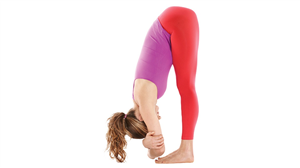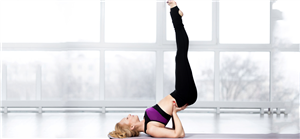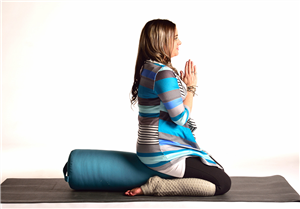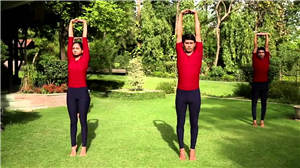1. Uttanasana (Standing Forward Bend Pose)
This intense stretching pose is known to relieve stress and reduce fatigue by calming your brain nerves. It is also great for treating headaches and insomnia that can hamper your sleep.
Stand straight with your feet apart. Raise your hands above your shoulders and stretch gently. Then, fold your torso reaching toward the ground. Keep your knees straight. You can decide to place your palms on the ground (in front of your feet or next to them) or wrap them around your ankles. If it’s not possible, then cross your forearms and hold your elbows. Press your heels into the floor and keep your head and chest in. Now, as you inhale, stretch your front torso slightly and while exhaling emphasize on the forward bend. Hold the pose for about 30 seconds, release and then gently come back to the standing position.
2. Viparita Karani (Leg Up The Wall Pose)
This asana is a restorative pose which means it improves your blood circulation. Find a wall and sit in front of it with your feet on the floor. Place a support like a bolster or a cushion under your lower back about half a foot away from the wall.
Exhale and gently lie on your back stretching your legs against the wall such that the back of your legs press against the wall and your soles are facing upwards. Keep your sit bones as close to the wall as you can. Look up with your face and chin in one line. Open your arms sideways, lengthen your neck and keep your legs firm. If you do not wish to use the support, you can use your hands to support your hips and rise to form a curve in your body. With the help of a support, you can stay in this pose for as long as 5 minutes.
3. Virasana (Hero Pose)
This asana is basically a meditative pose. It really helps you in calming you down and makes you physically and emotionally stable. It also helps in relieving tired legs. Kneel down on the floor, with your knees bent and your legs folded underneath you.
Let your hand rest on your thighs or you can also fold them in front of your chest. Bring your knees to close so that the gap between your feet automatically widens. It should be wider than the width of your hips. The top of your feet should be flat on the floor and your spine should be straight. If you feel too much pressure on your knees, you can place a pillow between your calves and thighs. Hold the position for 30 seconds.
While you are in the sitting positions, it stimulates the pressure points on your feet that help in relaxing your whole body. You can also use this position to meditate and breathe deeply. It instills a sense of quiet while making you aware of your mental state.
4. Tadasana (Mountain Pose)
Regarded as the ‘mother of asanas’, Tadasana is like the base from which all the poses emerge. This steady and concentrated posture of the pose can really help calm the mind. Stand straight with your feet slightly apart.
Keep your hands hanging by your side. Make your thigh muscles firm and slightly turn them inwards while lifting your kneecap. Lengthen your tailbone and imagine a line of energy passing through your body. Lift your chest up and out and push your shoulder blades back. Keep breathing deeply. While inhaling, you will feel the breath traveling through your toes, stomach and up to the head. As you exhale, feel your breath going down from the head to the stomach and finally your feet. You can concentrate on a spot in front of you to avoid any distraction. This helps in increasing your mental awareness.



 Contact Us
Contact Us






 Hospitals
Hospitals
 Doctors
Doctors
 Diagnostic
Diagnostic
 Pharmacy
Pharmacy
 Health Tips
Health Tips
 Blog
Blog






















